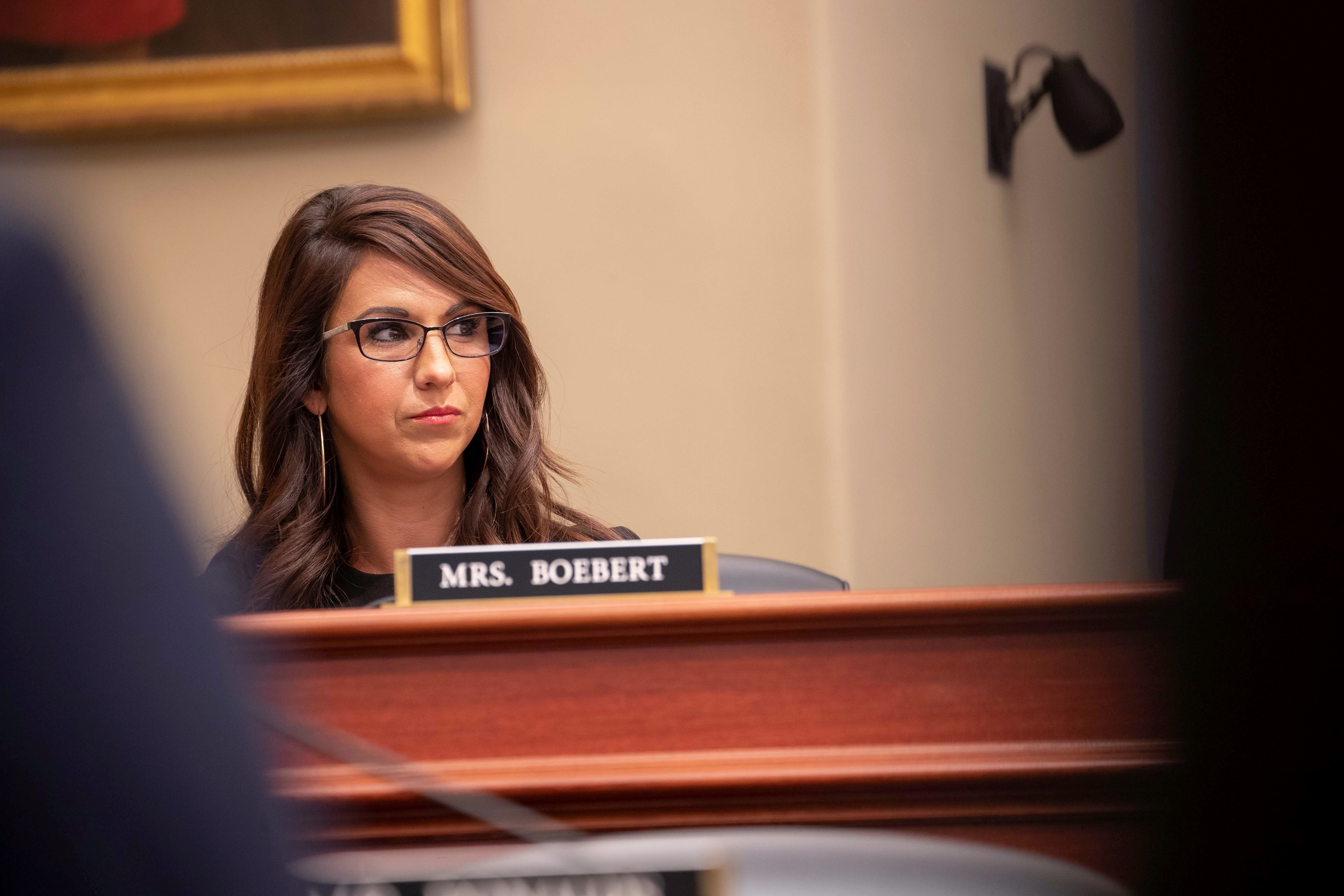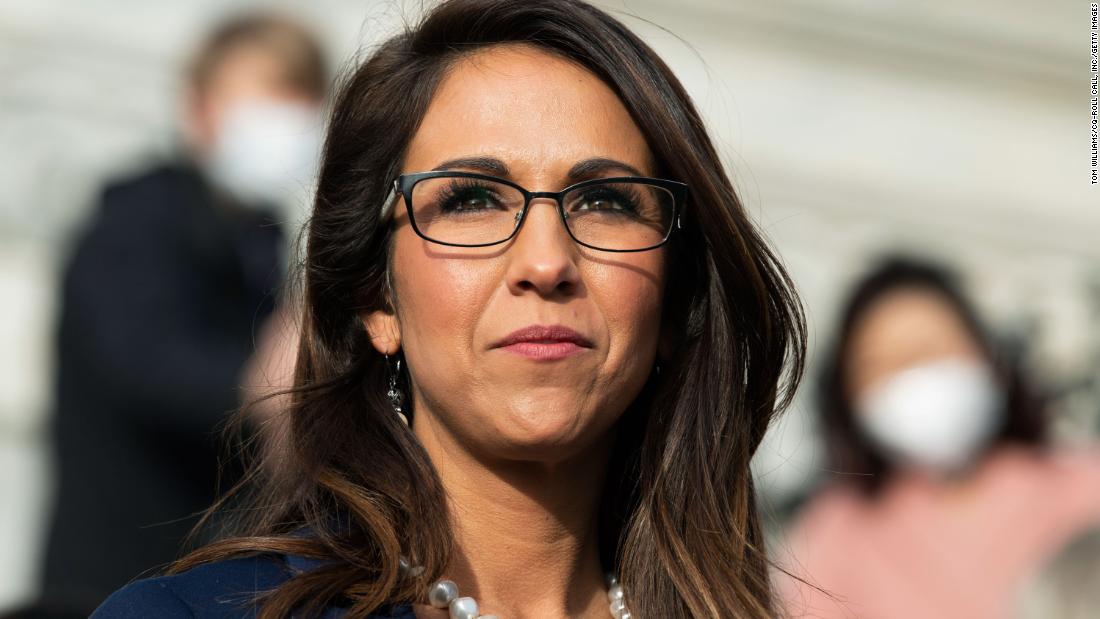Lauren Boebert's reported boob job has been a topic of discussion and speculation in the media and online.
The importance of this topic lies in the fact that it highlights the ongoing cultural fascination with female appearance and the pressure that women feel to conform to societal beauty standards. It also raises questions about the ethics of plastic surgery and the extent to which it should be normalized.
While some argue that plastic surgery is a personal choice that should not be judged, others contend that it perpetuates unrealistic and harmful ideals of beauty. The debate surrounding Lauren Boebert's reported boob job is likely to continue, as it touches on complex issues related to gender, body image, and the media's portrayal of women.
Lauren Boebert's Reported Boob Job
Lauren Boebert's reported boob job has garnered significant attention and sparked discussions on various aspects related to plastic surgery, body image, and societal beauty standards. Here are ten key aspects that encapsulate the topic:
- Personal Choice: Plastic surgery is often viewed as a personal decision, highlighting individual autonomy over one's body.
- Beauty Standards: Plastic surgery can be influenced by societal pressures to conform to idealized beauty norms.
- Ethics: The ethics of plastic surgery are debated, with some questioning its potential to perpetuate unrealistic beauty standards.
- Media Portrayal: The media's portrayal of celebrities and their plastic surgery choices can shape public perception and expectations.
- Body Image: Plastic surgery can impact an individual's body image, both positively and negatively.
- Self-Esteem: Some individuals may seek plastic surgery to enhance their self-esteem, while others may experience negative outcomes.
- Social Stigma: There can be social stigma associated with plastic surgery, leading to judgment or discrimination.
- Celebrities: Celebrities' plastic surgery choices often receive public scrutiny, influencing societal attitudes towards the procedure.
- Regulation: The regulation of plastic surgery varies across jurisdictions, with differing levels of oversight and patient protection.
- Cultural Factors: Cultural factors can influence attitudes towards plastic surgery, with varying acceptance and norms across different societies.
These aspects highlight the multifaceted nature of Lauren Boebert's reported boob job, encompassing personal, social, cultural, and ethical dimensions. The topic continues to spark discussions about the role of plastic surgery in our society and the complex factors that shape our perceptions of beauty and body image.
| Name | Lauren Boebert |
| Occupation | U.S. Representative for Colorado's 3rd congressional district |
| Date of Birth | December 15, 1986 |
| Political Party | Republican |
| Spouse | Jayson Boebert |
| Education | High school diploma |
Personal Choice
The personal choice aspect of plastic surgery is central to the discussion surrounding Lauren Boebert's reported boob job. It underscores the idea that individuals have the right to make decisions about their own bodies, including undergoing cosmetic procedures.
- Autonomy and bodily integrity: Plastic surgery allows individuals to exercise autonomy over their physical appearance, expressing their personal style and preferences.
- Self-expression and identity: For some, plastic surgery can be a means of self-expression and identity formation, enabling them to align their physical appearance with their inner sense of self.
- Medical considerations: In certain cases, plastic surgery may be sought for medical reasons, such as reconstructive surgery after an accident or to address a congenital condition.
- Cultural norms and influences: While personal choice is paramount, cultural norms and societal expectations can influence individuals' decisions regarding plastic surgery.
In the context of Lauren Boebert's reported boob job, the personal choice aspect highlights her right to make decisions about her own body and appearance, regardless of external opinions or judgments.
Beauty Standards
The connection between beauty standards and plastic surgery is evident in the case of Lauren Boebert's reported boob job. Societal pressures to conform to idealized beauty norms can influence individuals to seek plastic surgery to enhance their physical appearance and align with prevailing aesthetic standards.
In the context of Lauren Boebert's reported boob job, the desire to conform to societal beauty standards may have played a role in her decision to undergo the procedure. Western culture often emphasizes a youthful, voluptuous female body as the ideal, and breast augmentation can be seen as a way to achieve this desired aesthetic.
The pursuit of idealized beauty through plastic surgery can have significant implications. It can perpetuate unrealistic and narrow standards of beauty, leading to body dissatisfaction and negative self-image among those who do not conform to these norms. Moreover, the focus on external appearance can detract from other important aspects of an individual's life and well-being.
Understanding the connection between beauty standards and plastic surgery is crucial for critically examining the motivations behind cosmetic procedures and their potential impact on individuals and society as a whole. It also highlights the importance of promoting a more diverse and inclusive representation of beauty that values individuality and celebrates the uniqueness of all body types.
Ethics
The ethical implications of plastic surgery, particularly its potential to perpetuate unrealistic beauty standards, are a subject of ongoing debate. In the case of Lauren Boebert's reported boob job, this ethical concern is particularly relevant.
Proponents of this ethical viewpoint argue that plastic surgery can reinforce narrow and unattainable beauty ideals, leading to body dissatisfaction and negative self-image among those who do not conform to these norms. They contend that the pursuit of an idealized appearance through cosmetic procedures can detract from other important aspects of life and well-being.
Moreover, the ethics of plastic surgery extend to issues of informed consent and patient safety. It is crucial for individuals considering plastic surgery to be fully informed about the potential risks and benefits of the procedure, including the long-term physical and psychological implications.
Understanding the ethical considerations surrounding plastic surgery is essential for making informed decisions about cosmetic procedures. It also highlights the need for promoting a more diverse and inclusive representation of beauty that values individuality and celebrates the uniqueness of all body types.
Media Portrayal
The media plays a significant role in shaping public perception and expectations regarding plastic surgery, including the case of Lauren Boebert's reported boob job. The portrayal of celebrities and their cosmetic procedures in the media can influence societal attitudes towards plastic surgery and contribute to the normalization of certain beauty ideals.
- Celebrity Influence: Celebrities are often seen as role models and trendsetters, and their decisions to undergo plastic surgery can influence the public's perception of what is considered desirable or acceptable.
- Media Coverage: Extensive media coverage of celebrity plastic surgery, both positive and negative, can generate public discussion and shape opinions about the procedure.
- Beauty Standards: The media's portrayal of celebrities with surgically enhanced features can reinforce narrow and unrealistic beauty standards, leading to increased pressure on individuals to conform to these ideals.
- Normalization: Repeated exposure to images of celebrities who have undergone plastic surgery can contribute to the normalization of cosmetic procedures, making them seem more common and socially acceptable.
Understanding the connection between media portrayal and public perception is crucial for critically evaluating the impact of plastic surgery on society. It highlights the need for responsible media reporting that presents a balanced and diverse representation of beauty, promotes body positivity, and encourages critical thinking about the influence of the media on body image and self-esteem.
Body Image
The connection between body image and plastic surgery is complex and multifaceted, with potential implications for individuals considering cosmetic procedures such as Lauren Boebert's reported boob job.
- Enhanced Self-Esteem and Confidence: For some individuals, plastic surgery can lead to improved self-esteem and confidence. They may feel more comfortable and positive about their physical appearance, which can have a ripple effect on other aspects of their lives.
- Body Dysmorphic Disorder (BDD): On the other hand, plastic surgery can also contribute to or exacerbate Body Dysmorphic Disorder (BDD), a mental health condition characterized by a distorted view of one's physical appearance. Individuals with BDD may undergo multiple surgeries in an attempt to correct perceived flaws, but their dissatisfaction often persists.
- Social Comparison and Idealization: Plastic surgery can be influenced by social comparison and the pursuit of idealized body types portrayed in the media. This can lead to unrealistic expectations and dissatisfaction with one's own body, even after undergoing cosmetic procedures.
- Long-Term Psychological Impact: The psychological impact of plastic surgery can extend beyond the immediate post-operative period. Some individuals may experience regret, anxiety, or depression related to their decision to undergo surgery.
Understanding the potential impact of plastic surgery on body image is crucial for individuals considering cosmetic procedures. It highlights the importance of realistic expectations, thorough research, and seeking support from healthcare professionals who can provide guidance and support throughout the decision-making process.
Self-Esteem
Plastic surgery, including procedures like Lauren Boebert's reported boob job, can have a significant impact on an individual's self-esteem. While some individuals may seek plastic surgery with the hope of enhancing their self-esteem and body image, the outcomes can vary greatly.
For some individuals, plastic surgery can lead to improved self-esteem and confidence. They may feel more comfortable and positive about their physical appearance, which can have a ripple effect on other aspects of their lives. However, it's important to note that plastic surgery is not a guaranteed solution for low self-esteem. In some cases, it can even lead to negative outcomes.
One potential negative outcome is Body Dysmorphic Disorder (BDD), a mental health condition characterized by a distorted view of one's physical appearance. Individuals with BDD may undergo multiple surgeries in an attempt to correct perceived flaws, but their dissatisfaction often persists. Plastic surgery can also contribute to unrealistic expectations and dissatisfaction with one's own body, even after undergoing cosmetic procedures.
Understanding the potential impact of plastic surgery on self-esteem is crucial for individuals considering cosmetic procedures. It highlights the importance of realistic expectations, thorough research, and seeking support from healthcare professionals who can provide guidance and support throughout the decision-making process.
Social Stigma
The social stigma surrounding plastic surgery can manifest in various forms, including judgment, discrimination, and negative. In the case of Lauren Boebert's reported boob job, this stigma may stem from societal views on female beauty, body autonomy, and the perceived artificiality of surgically enhanced appearances.
Individuals who undergo plastic surgery may face criticism or disapproval from those who hold traditional or conservative beliefs about beauty and body modification. They may be labeled as vain, self-absorbed, or seeking external validation. This stigma can lead to feelings of shame, embarrassment, and social isolation.
Moreover, plastic surgery can be seen as a form of social inequality, as those with the financial means to undergo cosmetic procedures may be perceived as having an unfair advantage in terms of appearance and social status. This can exacerbate existing social and economic disparities.
Understanding the social stigma associated with plastic surgery is crucial for several reasons. First, it highlights the need to challenge societal norms and promote a more inclusive and diverse representation of beauty. Second, it underscores the importance of providing support and resources for individuals considering or undergoing plastic surgery, to mitigate the potential negative psychological and social consequences.
Celebrities
The connection between celebrities' plastic surgery choices and societal attitudes towards the procedure is undeniable. In the case of "lauren boebert boob job", this connection is particularly relevant as it highlights the influence of public figures on shaping societal norms and perceptions.
- Media Coverage and Public Discourse: Celebrities' plastic surgery choices often generate significant media coverage and public discussion. This coverage can shape public opinion about the acceptability, desirability, and potential risks and benefits of plastic surgery.
- Role Models and Beauty Ideals: Celebrities are often seen as role models and trendsetters, and their decisions to undergo plastic surgery can influence societal beauty ideals. This can lead to increased pressure on individuals to conform to certain physical standards and perpetuate unrealistic expectations about appearance.
- Normalization and Acceptance: Repeated exposure to images of celebrities who have undergone plastic surgery can contribute to the normalization and acceptance of the procedure. This can make it seem more common and socially acceptable, potentially leading to increased demand for cosmetic procedures.
- Scrutiny and Criticism: While celebrities' plastic surgery choices can influence societal attitudes, they also face public scrutiny and criticism. This can include negative comments, judgment, or accusations of vanity or inauthenticity.
Understanding the connection between celebrities' plastic surgery choices and societal attitudes is crucial for several reasons. First, it highlights the importance of critical media literacy and the need to challenge unrealistic beauty standards. Second, it emphasizes the role of celebrities in promoting body positivity and diversity. Third, it underscores the complex ethical considerations surrounding plastic surgery and the need for informed decision-making.
Regulation
The regulation of plastic surgery is a crucial aspect to consider in relation to "lauren boebert boob job", as it highlights the importance of ensuring patient safety, ethical practices, and informed decision-making in the field of cosmetic surgery.
- Oversight and Standards: The level of oversight and standards for plastic surgery can vary significantly across different jurisdictions. Some regions have strict regulations, including mandatory certification for surgeons, while others may have more relaxed requirements. This can impact the quality and safety of plastic surgery procedures.
- Patient Protection: Regulations related to patient protection are also important to consider. These may include informed consent procedures, cooling-off periods, and provisions for handling complaints or complications. Strong patient protection measures help ensure that individuals undergoing plastic surgery are fully informed about the risks and benefits, and that they have access to appropriate care and support.
- Ethical Considerations: Regulation can also play a role in addressing ethical considerations in plastic surgery. For example, some jurisdictions may have restrictions on certain types of cosmetic procedures, such as those that are considered excessively risky or that could lead to body dysmorphic disorder.
- Public Health and Safety: Regulations can contribute to public health and safety by ensuring that plastic surgery is performed by qualified professionals in safe and controlled environments. This helps minimize the risks of complications, infections, or other adverse outcomes.
Understanding the regulatory landscape related to plastic surgery is essential for ensuring patient safety, ethical practices, and informed decision-making. It also highlights the need for ongoing efforts to improve and harmonize regulations across jurisdictions to promote consistency and enhance patient protection in the field of cosmetic surgery.
Cultural Factors
The connection between cultural factors and attitudes towards plastic surgery is evident in the case of "lauren boebert boob job". Cultural norms, values, and beliefs can shape perceptions of beauty, desirability, and acceptability of cosmetic procedures.
- Beauty Ideals: Cultural factors influence beauty ideals, which can impact attitudes towards plastic surgery. In some cultures, certain physical attributes, such as breast size or facial features, are considered more desirable than others. This can lead to increased demand for plastic surgery procedures that align with these cultural beauty standards.
- Social Norms: Social norms can also influence attitudes towards plastic surgery. In some societies, cosmetic procedures are widely accepted and even encouraged, while in others they may be met with disapproval or stigma. These social norms can affect individuals' decisions about whether to undergo plastic surgery and how they view others who have had such procedures.
- Religious Beliefs: Religious beliefs can also play a role in shaping attitudes towards plastic surgery. Some religions may view cosmetic procedures as a form of vanity or a violation of the body's natural state. This can lead to negative attitudes towards plastic surgery and influence individuals' decisions about whether to undergo such procedures.
- Economic Factors: Economic factors can also influence attitudes towards plastic surgery. In societies where wealth and status are highly valued, plastic surgery may be seen as a way to enhance one's appearance and social standing. This can lead to increased demand for cosmetic procedures among those who can afford them.
Understanding the connection between cultural factors and attitudes towards plastic surgery is crucial for several reasons. First, it highlights the importance of cultural sensitivity and awareness when discussing or providing information about plastic surgery. Second, it emphasizes the need for inclusive and diverse representation of beauty in the media and popular culture. Third, it underscores the complex ethical considerations surrounding plastic surgery and the need for informed decision-making.
FAQs about Lauren Boebert's Reported Boob Job
This section addresses frequently asked questions surrounding Lauren Boebert's reported boob job, providing factual information and dispelling common misconceptions.
Question 1: Is there confirmation that Lauren Boebert underwent a boob job?
There is no official confirmation from Lauren Boebert or her representatives regarding whether she has undergone a boob job. Discussions surrounding this topic are based on media speculation and public commentary.
Question 2: What are the potential motivations for plastic surgery?
Individuals may consider plastic surgery for various reasons, including enhancing physical appearance, boosting self-confidence, or addressing body dysmorphic disorder. It is important to approach plastic surgery with realistic expectations and to prioritize health and well-being.
Question 3: Does plastic surgery guarantee improved self-esteem?
While plastic surgery can enhance physical appearance, it does not guarantee improved self-esteem. Self-esteem is influenced by a complex interplay of factors, including personal experiences, societal influences, and psychological well-being. Plastic surgery alone cannot resolve underlying emotional issues or low self-esteem.
Question 4: Are there risks associated with plastic surgery?
As with any medical procedure, plastic surgery carries potential risks, including infection, scarring, and complications during or after surgery. It is crucial to consult with a qualified and experienced plastic surgeon to thoroughly understand the risks and benefits involved.
Question 5: How can I make an informed decision about plastic surgery?
Making an informed decision about plastic surgery requires careful consideration and research. Consult with multiple board-certified plastic surgeons, research the specific procedure, and weigh the potential benefits and risks. It is also important to have realistic expectations and to seek support from trusted individuals.
Question 6: What are the ethical considerations related to plastic surgery?
Plastic surgery raises ethical concerns regarding body image, self-acceptance, and societal pressures. It is important to promote a diverse and inclusive representation of beauty, challenge unrealistic beauty standards, and prioritize mental health and well-being over physical appearance.
These FAQs provide general information and should not be considered medical advice. It is always advisable to consult with a qualified healthcare professional for personalized guidance and recommendations.
Moving on to the next section, we will explore the impact of media portrayal on public perception of plastic surgery.
Tips for Considering Plastic Surgery
Plastic surgery is a major decision that should not be taken lightly. If you are considering plastic surgery, there are a few things you should keep in mind.
1. Do your research. Before you decide to undergo any plastic surgery procedure, it is important to do your research and learn as much as you can about the procedure, the risks, and the benefits. You should also make sure to choose a board-certified plastic surgeon who has experience performing the procedure you are considering.
2. Be realistic about your expectations. Plastic surgery cannot make you look like someone else, and it cannot guarantee that you will be happy with the results. It is important to have realistic expectations about what plastic surgery can and cannot do.
3. Consider your mental health. Plastic surgery is not a solution for mental health problems. If you are struggling with body dysmorphic disorder or other mental health issues, you should seek professional help before considering plastic surgery.
4. Be prepared for the recovery process. Plastic surgery is a major surgery, and it is important to be prepared for the recovery process. You may experience pain, swelling, and bruising after surgery. You may also need to take time off work or school to recover.
5. Choose a support system. Having a support system of family and friends can help you through the recovery process. They can provide you with emotional support and help you with practical tasks, such as driving you to and from doctor's appointments.
By following these tips, you can make an informed decision about whether or not plastic surgery is right for you.
Conclusion:
Plastic surgery can be a life-changing experience, but it is important to be realistic about your expectations and to choose a qualified surgeon who can help you achieve your goals.
Conclusion
The exploration of "lauren boebert boob job" has highlighted various aspects of plastic surgery, its impact on individuals and society, and the ethical considerations it raises. Understanding the complexities surrounding this topic is essential for informed decision-making and critical engagement with societal attitudes towards cosmetic procedures.
As we navigate the evolving landscape of plastic surgery, it is crucial to prioritize body positivity, challenge unrealistic beauty standards, and promote mental well-being. By fostering inclusive and diverse representations of beauty, we can empower individuals to make choices that align with their values and aspirations, rather than societal pressures.
Unveiling The Truth: Bianca Lawson's Family Status Revealed
Unveiling Simone Boseman: A Journey Of Strength And Advocacy
Unveiling Ryan Tedder's Net Worth: A Journey Of Success

Lauren Boebert, HardRight Gun Activist, Wins in Colorado House

Lauren Boebert, GunRights Activist, Upsets House G.O.P. Incumbent in

In Colorado, Fiery Political Novice Aims for a Seat in the House The

Rep. Boebert Advocates for Colorado with Senior Biden Administration

Factchecking Lauren Boebert's story about a man getting beaten to
ncG1vNJzZmifmZi5t3rApqpsZpSetKrAwKWmnJ2Ro8CxrcKeqmebn6J8ra3Uq5ynZZKksqOx0a1km6efl3qru8Fnn62lnA%3D%3D